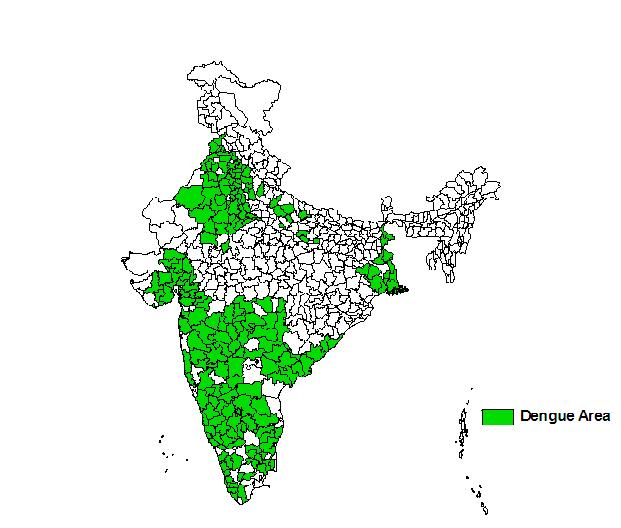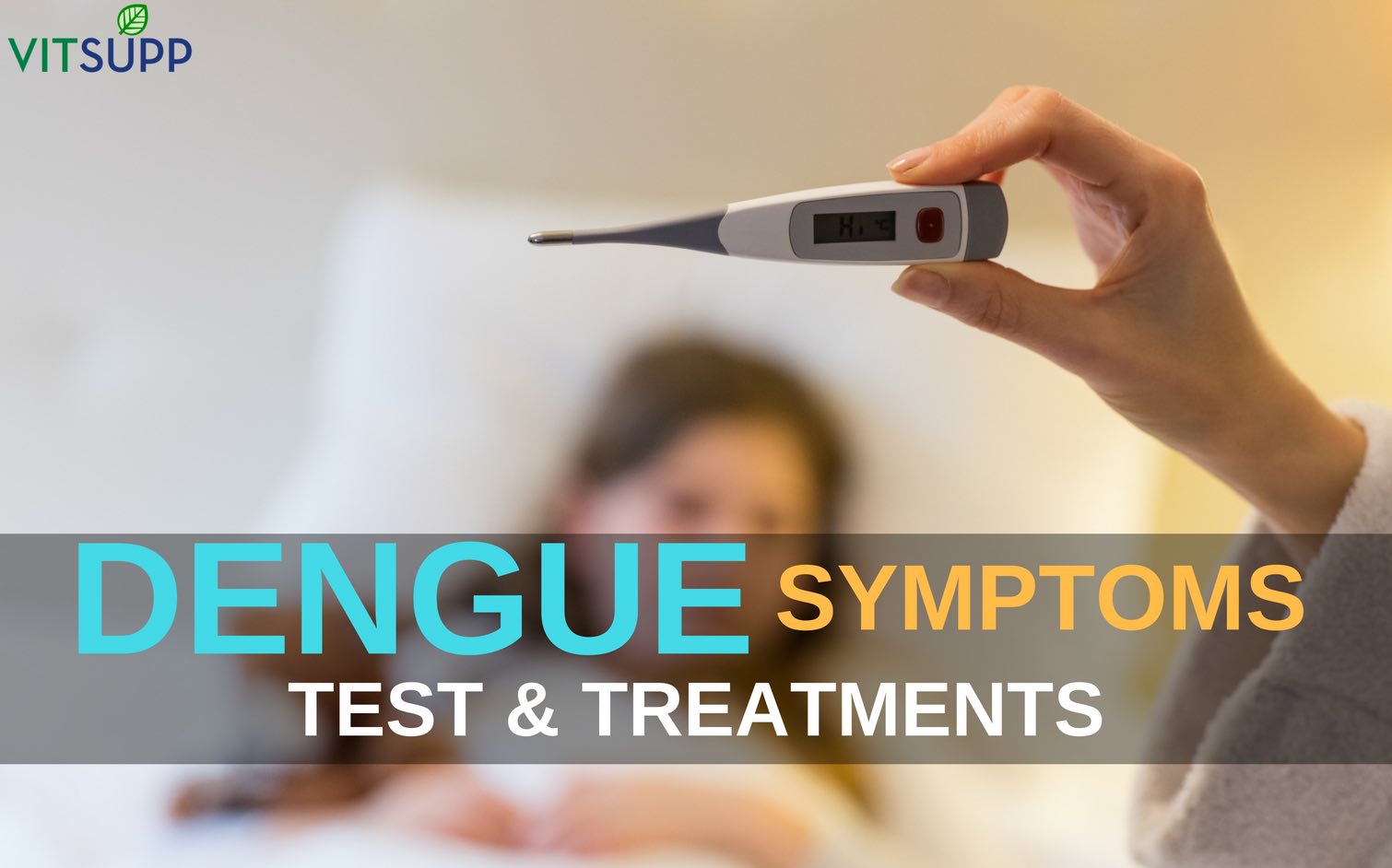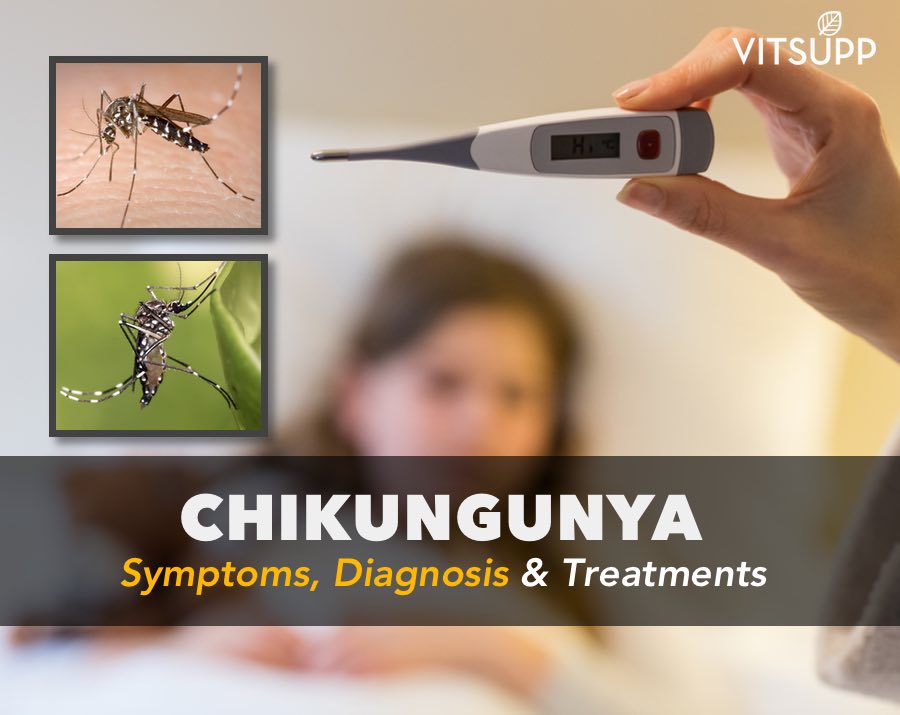Dengue fever (pronounced den-gee) is a mosquito-borne tropical disease caused by the dengue virus. Since the Second World War, dengue has been a global problem. It is common in more than 110 countries.
Dengue affects 50-528 million people every year, and results in 10,000-20,000 deaths. It is more prevalent in tropical and sub-tropical places, with most cases being reported from south east Asia, Africa and South America.
It is classified as a “neglected tropical disease” by the Centre for Disease Control and Prevention(1).
Contents
Dengue Virus
A person can contract dengue after being infected by any of the four type of dengue viruses. Dengue Fever Virus is closely related to viruses that cause the West Nile infection and yellow fever.
While a tropical disease, dengue cases have been recorded in Europe and USA. The victims in these cases are mostly tourists who have traveled to tropical regions(2).
Dengue spreads through the bite of the Aedes mosquito which is infected by the virus. The most common carrier is the Aedes aegypti mosquito. A female mosquito taking blood from an infected person can become a carrier of the disease.
The virus to incubates for 8-10 days inside the body of the mosquito before it is released in the saliva. This mosquito breeds in stagnant or collected water.
When the virus enters the human bloodstream, it enters the white blood cells and reproduces rapidly. It spreads rapidly with blood circulation. Hence, the white blood cells release a number of proteins, which leads to muscle and joint pain and fever.
In severe cases, the virus may affect organs like liver and even bone marrow. Spread of the infection results in low blood pressure. Hence, vital organs do not get sufficient blood supply.
When the bone marrow is infected, stormal cells get infected. This reduces platelet count. Platelets enable blood clotting. Thus, with decreased platelet count, bleeding may occur from nose or gums.
Transmission of the Disease
Dengue spreads through mosquito bites.
Dengue fever cannot spread directly from one person to another. It is non-contagious. However, it can spread through blood transfusion, if the blood is taken from a dengue patient.
There are cases reported where the disease passed from mother to child during pregnancy or birth, though such instances are extremely rare(3).
Dengue Fever Symptoms
Visible symptoms of dengue fever include
- High fever
- Severe headaches
- Backache
- Joint pain & Fatigue
- Nausea and vomiting
- Eye pain
- Rash (3-4 days after the fever begins)
Usually, these become apparent after 4-7 days of being infected , and the illness lasts 3-14 days, although full recovery can take a month. (4).
Many dengue cases are often mistaken for signs of flu or influenza. In adults, nausea and vomiting may occur during the course of the disease. Sometimes, swelling occurs in lymph nodes in the neck and groin region.
Dengue patients often suffer from rashes. Dengue rashes often resemble rashes from measles. In other cases, the rashes look like “islands of white in a sea of red”.
In about 2% of cases, dengue fever turns into a more severe form called dengue hemorrhagic fever (DHF). This form is characterized by a fever that lasts from 2 to 7 days and in addition to the above common dengue symptoms, is accompanied by:
- Hemorrhagic manifestations
- Bruising easily or other skin hemorrhages
- Bleeding nose or gums
- Possible internal bleeding
- Fainting
- Less frequent urination
The ability to differentiate between dengue and influenza is crucial to stop the progress of dengue to its deadly hemorrhagic form.
A simple blood test is all that is needed to confirm a dengue diagnosis. With good medical management, mortality due to Dengue hemorrhagic fever is as low as 1-5 percent. Most fatalities occur among children and young adults.
Course of Dengue Fever
Dengue fever usually has three phases- febrile, critical and recovery. High fever occurs during the initial stage. The fever itself breaks and returns for a couple of days.
In some cases, dengue enters a more critical phase following the resolving of the fever. During this period, plasma leaks from blood vessels. This stage lasts for a couple of days. As a result, fluid depletes from the circulation system and blood supply reduces to vital organs. Instead, fluid accumulates in chest and abdomen.
People suffering from dengue have reduced platelet count, often below 20,000(5). People who otherwise have low platelet count are at a greater risk of developing complications. Children are more likely to develop severe complications and are at greater risk of contracting dengue hemorrhagic fever.
During recovery, bloodstream re-absorbs the fluid. This usually takes two or three days, and often the improvement in the condition of the patient is striking.
This stage shows itching and a slower heart rate. Rashes may also occur, which lead to peeling of dry skin. Many patients report feeling fatigued.
Pregnant women suffering from dengue may suffer miscarriages. It can also lead to low birth weight and premature birth.
Dengue Haemorraghic Fever: How is it Different?
The World Health Organisation classifies dengue into two categories: uncomplicated and severe. Dengue hemorrhagic fever is a severe form of the disease. This is again classified into four categories based on severity.
Dengue hemorrhagic fever is a rare condition. It has symptoms like high fever, damage to lymph nodes, bleeding from nose or gums, diarrhea and vomiting(6). This may further progress to shock and death. This is called Dengue Shock Syndrome.
People who have previously suffered from dengue are more vulnerable to the disease.
Dengue Tests and Diagnosis
Doctors can diagnose dengue from blood tests. The most common method is detection of dengue-specific IgM and IgG-class antibodies.
In many cases, diagnosis requires both, since the human body produces a varied number of antibodies during the course of the disease.
IgM antibodies are developed in the initial stages, and tests for these are more effective when conducted 7-10 days after exposure. after a few months, IgM antibodies decrease and fall below detection levels(7).
On the other hand, IgG antibodies develop more slowly. They develop during the acute stage and persist for a long time.
NS1 antigen tests are done in the earlier stages of the disease for detecting IgM antibodies. The antibodies-based test IgM-Elisa is done after five days and it is a confirmatory test. Doctors insist on doing the IgM-Elisa even though the fever resolves.
It is difficult to distinguish symptoms of dengue from chickungunya and other mosquito-borne diseases like malaria. Often, confirmation requires multiple tests and prolonged investigation to rule out diseases like malaria, measles and influenza.
The recently discovered Zika virus also shows symptoms similar to dengue.
Dengue Treatment
There is no specific anti-viral treatment for dengue illness.
Since dengue is a virus, antibacterial medicines do not have any effect. Treatment includes giving the patient fluids orally or intravenously. The fever and muscle pain is managed with paracetamol and anti-inflammatory drugs.
Doctors recommend watching patients for signs of dehydration. Dengue weakens patients, and they often feel fatigued and nauseous. Doctors usually recommend ample rest and bed rest in more severe cases.
In India, many recommend taking crushed papaya leaves with milk or other fluids to increase platelet count, though there is no evidence to support this claim.
Dengue Vaccine
In 2016, a partially effective vaccine for dengue fever (Dengvaxia) was approved. It is commercially available in Mexico, the Philippines, Indonesia, Brazil, El Salvador, Costa Rica, Paraguay, Guatemala, Peru, Thailand, and Singapore. However,WHO recommends that it be used only in areas the disease is prevalent(9).
Trials showed that the vaccine is more effective for people who have suffered from dengue previously.
Dengue fever in India: Outbreak and Rapid Spread

Dengue is pronounced den-gu in India.
Many Indian states and cities report cases of dengue every year, but outbreaks have noticeably increased.
Increase in number of cases has been a major cause of concern by the National Vector Borne Disease Control Programme (10).
In 2017, official statistics reported 1,88,401 cases and 325 death from dengue. (11)
The first epidemic of dengue fever occurred in Calcutta (now Kolkata) and Eastern Coast of India in 1963-1964. A major outbreak happened in New Delhi and Lucknow in 1996, from where it spread to the rest of the country. More than 3600 people were affected and 50 people dead in a 2005-06 outbreak in New Delhi.
A massive outbreak happened again in 2015 in New Delhi. It subsequently spread to other places. More than 10,000 people tested positive and at least 32 deaths were attributed to it.
Dengue being an urban-occurring disease, spreads rapidly in areas with poor hygienic and sanitation conditions. Parts of India which experience more rainfall and water-logging report more cases.
With increased migration and urbanization, the disease spreads fast.
Cost of Dengue Diagnosis and Treatment in India
Treatment and diagnosis costs for dengue fever are highly subsidized in India. The National Vector Borne Disease Control and Prevention Programme regards it as a matter of high importance.
In all government hospitals, tests for detection are free. Many state governments like Delhi and Maharasthra have capped test costs at Rs 600 even for private laboratories. However, private hospitals charge a lot for treatment.
Many patients require platelet separation and transfusion, and have to pay hefty sums for their treatment.
Preventing Dengue
Dengue-carrying mosquitoes breed in stagnant and collected water. These mosquitoes breed in places like desert coolers, drums, jars, pots, buckets, flower vases, plant saucers, tanks and cisterns. (12)
Drain the water collected in these places. Chemical larvicides or aerosol sprays should be sprayed to kill the larva. Water storage containers should be properly covered and be treated with disinfectants.
Larvivorous fish may be introduced in lakes, ponds and fountains.
Personal hygiene should be maintained. Precautions include using mosquito repellent creams, liquids or mats. Mosquito nets are a must in areas where dengue is common, especially during rainy season.
Controlling the spread of dengue requires integrated effort. Communities should come together to prevent its spread.
16th June is National Dengue Day in India. Governments and communities undertake various initiatives to fight the disease. This includes raising public awareness, educational drives in schools, destruction of mosquito habitats and distribution and mosquito nets. (13)
Dengue FAQs
What are the symptoms of dengue?
High fever, itchiness, rashes, fatigue, muscle and joint pain, headache. Many dengue cases are often mistaken for signs of flu or influenza. In adults, nausea and vomiting may occur during the course of the disease. Sometimes, swelling occurs in lymph nodes in the neck and groin region.
Dengue patients often suffer from rashes. Dengue rashes often resemble rashes from measles. In other cases, the rashes look like “islands of white in a sea of red”.
Is dengue contagious?
No. It cannot spread directly from person to person. It is a non-contagious disease. However, it can spread through blood transfusion, if the blood is taken from a dengue patient. There are cases reported where the disease passed from mother to child during pregnancy or birth, though such instances are extremely rare.
What is dengue?
It is a disease that happens when a person is infected by the dengue virus. It spreads through mosquito bites. The most common carrier is the Aedes aegypti mosquito.
How does dengue spread?
Dengue spreads through mosquito bites. A person gets infected when a mosquito carrying dengue virus bites him or her. If a mosquito bites a person with dengue, it becomes a carrier. After a brief incubation period, the dengue virus is released in the saliva of the mosquito. When this mosquito bites another person, the virus enters the human bloodstream through the saliva and the person becomes infected.
How to treat dengue?
There is no treatment for dengue. Doctors may prescribe paracetamol to manage the fever and other medicines for muscle pain. If rashes occur, treat them with soothing topical medicines that contain aloe vera. It is important to prevent dehydration. Doctors prescribe lots of fluids, and constant supervision. In case the patient shows signs of diarrhea, it may indicate the onset of dengue hemorrhagic syndrome. In these cases, immediate hospitalization is required.
What to eat during dengue?
Drink lots of water and fluids. Eat fruits rich in vitamin C, like oranges and pears to boost immunity. Some Indian naturopaths recommend drinking the juice of papaya leaves is beneficial for dengue patients, but this claim is not supported by any scientific evidence.
How to increase platelet count?
Eat animal protein like chicken and fish which are rich in Vitamin B12. Also eat fruits which are rich in vitamin C. In extreme cases, platelet transfusion is needed. Platelets not only fight diseases, they are also crucial for blood clotting. So, if platelet count falls, bleeding may occur from gums and wounds.
What are tests for dengue?
Dengue is determined after doing blood tests. The first test is called NS1 antigen test. The final test is IgM-Elisa test. IgM-Elisa test is the conclusive one, and doctors often recommend it even after the fever is abated. Otherwise, if the patient is still infected, the fever can come back after treatment stops and result in severe complications.
How much do dengue tests and treatment cost?
Tests are done for free in all government hospitals. Many state governments too, like in Delhi and Maharashtra, have put a cap on dengue test costs for even private hospitals. In severe cases, patients may need to be hospitalized. In some extreme instances, platelet transfusion is required, which is costly.
Is there a dengue vaccine?
There is a dengue fever vaccine, called Dengvaxia, but it is not available in India. This vaccine is effective on people who have contracted dengue earlier, and trials show people who take it as a preventive do not respond well to it. The vaccine is commercially available in 11 countries.
Where do dengue mosquitoes breed?
Dengue mosquitoes breed in places where water is collected or stagnant. Ponds, drains, buckets, plant pots, tanks and tree holes are some common breeding grounds.
How to prevent dengue fever?
Use mosquito nets, repellents and creams. Keep your home and surrounding areas clean. Drain out water from any places where it has collected for some time. Spread insecticides and larvicides to kill the larvae in water bodies. Introduce larvivorous fish in ponds that destroy mosquito habitats.
Read This Next
References
- Neglected Tropical Diseases. CDC
- Global Health Impacts of Vector-Borne Diseases: Workshop Summary. NCBI
- Perinatal transmission of dengue: a case report. NCBI
- Dengue symptoms and course. WHO
- The value of daily platelet counts for predicting dengue shock syndrome: Results from a prospective observational study of 2301 Vietnamese children with dengue. NCBI
- Dengue hemorrhagic fever and shock syndromes. NCBI
- Diagnosis of Dengue. Mayo Clinic
- Treatment of Dengue. NDTV
- Dengue Fever. WEBMD
- Dengue vaccines. WHO
- Dengue in India NCBI
- Dengue situation in India. Ministry of Health & Family Welfare, Government of India
- Vector Control Measures. Ministry of Health & Family Welfare, Government of India
- National Dengue Day. National Health Portal



